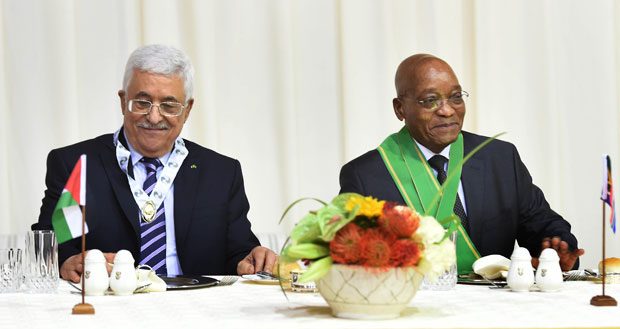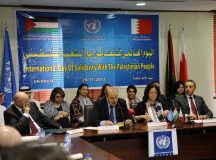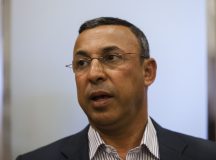Has the internationalisation strategy pushed by President Abbas transformed international public opinion and diplomacy and set the Palestinians on the path to statehood? Adam Rasgon and Grant Rumley suggest not.
Introduction
Palestinian Authority (PA) President Mahmoud Abbas travelled to Athens in late December to thank the Greek Parliament for recognising the ‘State of Palestine’. Abbas hailed the Greek Parliament’s decision and declared: ‘This is a grand Palestinian-Greek wedding.’ The Palestinian leader frequently travels to European capitals these days. In the past year, he has lobbied European Union (EU) officials in Brussels, courted the support of United Nations (UN) officials in Geneva, and sought the backing of Russian President Vladimir Putin in Moscow.
Glad-handing foreign dignitaries at UN offices in New York or Europe is part of a calculated strategy by Abbas to shift the Palestinian focus to the international arena. However, it has cost Abbas dearly at home. Palestinians, though overwhelmingly supportive of Abbas’s efforts to join international bodies such as the International Criminal Court (ICC), still think the aging Palestinian leader should resign.
Abbas’s quest for European recognition has come amid a downturn in relations with his Arab neighbours. A major crisis erupted between the PA and Jordan when Palestinian officials failed to coordinate with their Jordanian counterparts at the UN Security Council (UNSC) in December 2014. Saudi Arabia hosted a delegation from Hamas, Abbas’s Gaza adversaries, in July 2015. Egypt, though nominally in support of Abbas’s never-ending crusade against Hamas, regularly hosts Abbas’s top rival in Cairo.
Palestinian foreign policy in the Abbas era has largely focused on prioritising symbolic victories over pragmatic ones. Winning a vote at the UN General Assembly (UNGA) in 2012, or joining a host of international organisations in 2014 and the ICC in 2015, have done little to change the daily reality for Palestinians in the West Bank and Gaza. These symbolic victories have convinced Abbas of an area of strength in the international community that isn’t necessarily there. His plans for another push at the UNSC and a possible international conference – as referenced in a meeting with Israeli journalists in January – are unlikely to win back a disillusioned people or please his neighbours.
Why have the Palestinians turned to internationalisation?
The Palestinian strategy of internationalisation began long before Abbas assumed the Palestinian presidency in 2005. In fact, it first took form in 1974 when the Palestinian Liberation Organisation (PLO) issued a ten-point plan, which recognised the need to develop relations with the broader international community to shift ‘the balance of power’. In the years following, former PLO Chairman Yasser Arafat continued to develop this strategy, eventually urging the international community to support a conference based on UNSC resolutions 242 and 338 in his address at the UNGA in 1988.
However, the PLO suddenly halted internationalisation when the United States (US) invited them to participate in bilateral talks with Israel. With the subsequent Oslo Accords and other agreements, the PLO continued to support direct talks over internationalisation, which more or less remained true until the collapse of the Obama-led peace talks in 2011. Mahmoud Abbas, the new chairman, decided in 2011 to return to the policy of internationalisation after the talks failed to get off the ground. Writing in the New York Times, Abbas announced the Palestinians would be turning to the UN for recognition. The launch of this campaign to become the 194th state in the international community – or ‘Palestine 194’ as it is known in Ramallah – was underway.
In the coming years, Palestine 194 would lead the Palestinians to upgrade their standing in various international organisations. Now, Ramallah is encouraging the French to hold a peace conference that would – in their hopes – lead to further conferences and UNSC resolutions in their favour.
This is the era of the Palestinian ‘Plan B’. For decades, ‘Plan A’ was bilateral negotiations with Israel under the Oslo parameters. Yet, between the lack of interest from the Obama administration and the general preference among the Palestinian leadership to continue pursuing internationalisation, any peace talks are a distant fantasy. The PA’s internationalisation campaign and relations with other countries will define the near future of Israeli-Palestinian peacemaking. Yet, in 2016, if the PA’s internationalisation campaign is relatively clear, its relations with Arab countries, and the world, is anything but.
The PA’s deteriorating relations with its Arab neighbours
Jordan
The PA’s relationship with Jordan has suffered in recent years. Unstable relations between the Palestinian leadership and Jordan date back to the Oslo Accords, the historic agreement Israel and the PLO negotiated secretly. Ever since the signing of Oslo, Jordan has feared that the Palestinian leadership would forgo coordinating with them on other major decisions – particularly over Jerusalem – and thereby undermine their interests.
The past few years have only reinforced this fear. Faced with a crippling Syrian refugee crisis and the looming threat of Islamic State (IS) in neighbouring Iraq and Syria, the Jordanians have de-prioritised the Palestinian quest for statehood. Abbas has responded by increasingly bucking advice from Amman, specifically at the UN. According to Palestinian journalist Daoud Kuttab, Abbas insisted on advancing a resolution at the UNSC on Palestinian statehood in December 2014, even though Jordan’s UN Ambassador, Dina Kawar, opposed such a move. Kawar advised the PA to wait until after new members, who would likely vote in favour of the resolution, assumed their UNSC seats. Despite Kawar’s recommendation, the PA announced the publication of the resolution in blue – the UN jargon meaning the official publication of the resolution.
Chief Palestinian negotiator Saeb Erekat attempted to backtrack this issue, insisting the Palestinian leadership had amended their resolution after consulting Jordan. But it was clear the Jordanians were not in the loop. Eventually, the PA announced its final publication and forced Jordan to bring the resolution to a vote. It’s hard to understate how traumatic this incident was for the Palestinian-Jordanian relationship. Kawar refused to speak to the press after the vote, and the Palestinians – who lost the vote by a narrow margin – were forced to do damage control with the Jordanians.
Abbas tried to heal the rift with Jordan weeks later at a meeting of the Arab League, suggesting the pan-Arab body create a consultative Arab committee to study future Palestinian UN initiatives: ‘We will be committed to any decision made by this committee.’ However, relations continued to deteriorate when Jordanian officials uncovered secret meetings on Jordanian soil between Israel and the PA in late May 2015. The meetings allegedly infuriated Jordanian officials – King Abdullah even scolded Abbas about the back-room dealings a month later.
While poor coordination rests at the centre of tensions between the PA and Jordan, other events have further troubled the relationship. Jabril Rajoub, the Palestinian representative to FIFA, failed to make clear his support for Prince Ali bin Hussein, former candidate for president of FIFA and King Abdullah’s brother, at the FIFA Congress in May. Even though Rajoub swore he voted for Hussein, the ambiguity surrounding his vote prompted an uproar in the Jordanian public and government. Social media blasted Rajoub with twitter users posting the hashtag, ‘a red card for Jabril Rajoub’. Jordanian authorities also threatened to rescind his Jordanian citizenship and to not allow him to return to Jordan. The incident eventually evolved into a full-blown diplomatic crisis and President Abbas intervened to reduce tensions, personally visiting Prince Hussein at his Amman residence. It wasn’t until many weeks later when Prince Hussein called Rajoub to wish him a happy Eid that the relationship was mended.
Furthermore, another rift between the PA and Jordan emerged during the recent round of terror sweeping through Israel and the West Bank. Riyad al-Maliki, the Palestinian foreign minister, angered Jordan when he described an Israeli-Jordanian agreement to install cameras on the Temple Mount as a ‘trap’. Jordan did not publicly admonish al-Maliki, but several Jordanian news outlets reported that Jordanian officials asked him to clarify his statements. Al-Maliki, thereafter, apologised for his statement, but claimed that ‘some misunderstood my statements’, which he meant to direct at Israel and not Jordan. Even though al-Maliki expressed remorse for his remarks, he continued to criticise the plan to install cameras to Jordanian officials privately, leading the latter to eventually suspend it. These incidents further undermined Jordan’s confidence that the PA is an effective partner.
Poor coordination and communication is a driving factor in the rocky Palestinian-Jordanian relationship. Between the threat of ISIS, a poor economy, and the massive burden of millions of Syrian refugees, the Hashemite Kingdom has little bandwidth for the Palestinian national project. Such de-prioritisation is likely to only further frustrate the PA and fuel tensions between the two neighbours.
Saudi Arabia
Saudi Arabia historically has been one of the PA’s biggest supporters. The Kingdom has provided billions of dollars of budgetary support since the PA’s founding in 1994 and continues to average 20 million dollars in monthly transfers to its coffers. This aid package has occasionally come with direct Saudi involvement in Palestinian politics. For instance, after the Palestinian civil war in 2007, the Saudis sponsored a reconciliation process in Mecca between the Fatah-dominated PA and the winners of the Palestinian legislative elections, Hamas. After the reconciliation process collapsed, the West Bank and Gaza Strip were permanently split from each other, with Fatah and the PA claiming the West Bank and Hamas claiming Gaza Strip. Saudi policy from that point on largely favoured the PA over Hamas.
Today, PA-Saudi relations appear on stable ground. Abbas visited King Salman in early December after announcing that the PA would join the Saudi-led Islamic coalition, putatively formed to combat regional terrorism. Just days later, Abbas expressed strong support for Saudi Arabia after Iranian protesters set fire to their embassy in Tehran. He emphatically told a group of journalists and local Christians in Bethlehem: ‘We are with Saudi and everything it has done because we know it is justified.’ Abbas’s top peace negotiator echoed his remarks a week later, insisting: ‘Iran should stop poking its nose in Arab affairs.’
However, Saudi Arabia has kept its options open at times. The Kingdom hosted a Hamas delegation including political leader Khaled Mesha’al and several members of the politburo in July 2015. This was the first Hamas visit to Saudi Arabia in three years. Ostensibly, the visit dealt with the issue of Hamas-Fatah reconciliation and Saudi efforts to form a united Arab bloc against Iran and its regional allies.
Shortly after the Hamas visit and the conclusion of the Iran nuclear deal in July 2015, Abbas and other Palestinian leaders announced a thaw in relations with Iran, sending an indirect message to the authorities in Riyadh. Abbas also dispatched Ahmad Majdalani, a member of the PLO’s highest decision-making body, the Executive Committee, to Iran to meet Iranian Foreign Minister Javad Zarif and discuss ways to restore relations. Following his visit, Majdalani announced that Abbas would visit Iran in the coming months and the possible appointment of an Iranian ambassador to the PA. Time, however, has exposed Abbas’s gambit for what it was, as he has still not visited Tehran or received an Iranian ambassador.
PA-Saudi Arabia relations recently hit a snag over a soccer match. A pre-scheduled FIFA match was originally planned to take place in the West Bank, yet Riyadh refused to travel to the Palestinian territory for fear of tacitly ‘normalising’ relations with Israel. The Chairman of the Palestinian Football Federation, Jabril Rajoub, refused to relocate the match, angering Saudi Arabia, who then threatened to withdraw altogether from the match. FIFA stepped in at the eleventh hour, however, when it ruled the match could take place on a neutral field. The match eventually took place in Amman, where the teams tied 0-0. While this dispute may seem petty and inconsequential, it reflects the tumultuous nature of the relationship today.
Ramallah-Riyadh relations have ebbed and flowed. As Saudi counters Iranian influence in the region, it has increased cooperation and reaffirmed its strong relationship with the PA. However, after an Iran deal that bolstered Tehran’s standing in the region, the PA has flirted with ingratiating itself with Iran over Saudi Arabia. In the Riyadh-Tehran struggle for regional hegemony, the Palestinians appear to be another political football.
Egypt
Egypt’s ties with the PA have improved since the fall of the Muslim Brotherhood’s Mohammed Morsi and subsequent rise of President Abdel Fattah al-Sisi to power in July 2013, but its relationships with rivals within the PA have complicated them. Egypt has maintained close contact with Mohammed Dahlan, Abbas’s main adversary in Fatah. Dahlan reportedly has met al-Sisi and senior Egyptian officials on multiple occasions and even brokered a diplomatic accord between Egypt and Ethiopia.
Al-Sisi views Dahlan as a strategic asset with influence in Gaza. Egyptian officials have negotiated temporary openings of the Rafah crossing with Dahlan on more than one occasion. More recently, reports have surfaced that Al-Sisi attempted to mediate a reconciliation between Abbas and Dahlan, which would ostensibly allow the latter, who fled the West Bank and was ousted from Fatah, both in 2011, to re-enter the Palestinian and Fatah political arenas. While Egypt still works directly with Abbas and the PA, its parallel relations with Dahlan have increasingly concerned PA leaders that it may undercut its interests.
Moreover, Egypt allowed Hamas to partially restore its activities in Egypt following an appellate court decision delisting it as a terrorist organisation in June 2015. Mousa Abu Marzouk, a senior member of Hamas’s Politburo, has since travelled to Cairo to meet with Palestinian and Arab officials. However, the Egyptian Minister of Interior Magdy Abdel Ghaffar accused Hamas in early March of assassinating its Prosecutor General Hisham Barakat. Though Cairo has not taken any additional punitive measures, relations remain complicated. A high-level Hamas delegation visited Cairo weeks after the accusations in an attempt to mend ties.
Egypt had previously clamped down on Hamas, first outlawing the Izz ad-Din al-Qassam Brigades, Hamas’s military wing, and then more generally Hamas as a whole. Al-Sisi had also ordered the demolition of Hamas smuggling tunnels between Gaza and Sinai and the closing of the Rafah crossing for indefinite periods of time. While Egypt still heavily restricts Hamas activity, recent decisions demonstrate a willingness to coexist with Hamas, compounding PA fears that its influence in Cairo has eroded further.
Yet the PA still cooperates with Egypt on a variety of issues. In particular, Egypt has strongly supported the return of the PA to the Rafah crossing. In the aftermath of the 2014 Gaza War, Egypt made clear that reopening the crossing must include the return of PA forces to Rafah. Even though the PA did not return to Rafah after the war, Egypt has steadfastly held its position vis-a-vis Rafah. In November, Egypt and the PA struck an accord to reopen the Rafah crossing, pending the PA take control over it. The accord unlikely will come to fruition because Hamas has rejected it, but it demonstrates ongoing cooperation between Egypt and the PA to secure their shared interests.
Egyptian-PA relations have improved since the arrival of Al-Sisi, who has clamped down on Hamas and its military wing. Nonetheless, Cairo has sent a clear message to the PA that it views its main rival, Mohammed Dahlan, as a legitimate partner and will not completely shut its doors on Hamas. The complicated Egyptian-PA relationship is further compounded by an increasingly closer Egyptian-Israel relationship, which has Ramallah on the outside looking in.
Under Abbas, the Palestinians have sought to forge new ties with other countries
In Abbas’s calculation, Arab support for the Palestinian cause has rarely passed the rhetorical level. The Arab League may be willing to keep the PA’s budget afloat, but Abbas’s neighbours are mostly pre-occupied with their own domestic crises in the post-Arab Spring. Faced with disinterested neighbours, Abbas has amped up his campaign for recognition in the broader global community.
Abbas has found a welcome audience in Europe. European public opinion polls regularly show a wide swath of support among citizens for the Palestinian cause, and governments have generally followed suit. In December 2014, the EU Parliament voted 498 to 88 in favour of recognising Palestinian statehood based on the two-state solution. The vote followed a wave of parliaments recognising the State of Palestine, including the United Kingdom, France, Spain, Greece and Sweden. Though of little practical impact, this multilateral recognition accomplished little beyond cementing public support.
Abbas has not limited himself to European capitals. His predecessor, Yasser Arafat, often touted the nomadic presence of the Palestinians as a testament to the movement’s global appeal. Abbas has taken it a step further, extending his international campaign to Latin and South America as well as Asia.
Latin and South America
From the earliest days of his presidency, Abbas has focused on courting leaders in Latin and South America. In fact, one of the first trips abroad for the Palestinian president came in 2005 when Abbas travelled to Brazil for a summit of South American and Arab states. Abbas had an extended private conversation with Brazil’s then-President Luiz da Silva, who persuaded the Palestinian leader to consider closer rapprochement with the continent. By 2009, Costa Rica and Venezuela had officially recognised a Palestinian state. Within two years, Argentina, Chile, Peru, Uruguay, Paraguay, Bolivia, and Ecuador all followed suit. Today, Brazilian-Palestinian ties continue to flourish as the PLO opened its second embassy in the Western Hemisphere – in Brazil.
But the Abbas presidency found its most reliable South American ally in the government of Hugo Chavez. Palestinian-Venezuelan relations improved rapidly at the start of Abbas’s tenure, but crystallised after Operation Cast Lead in early 2009. Shortly after the war in Gaza, Chavez expelled Israel’s envoys from Caracas. Israel followed by returning the favour. Three months after the war ended, Chavez officially recognised a Palestinian state.
Since then, the relationship between Caracas and Ramallah has only grown stronger. Chavez regularly accused Israeli leaders of war crimes, often urging the ICC to investigate. His successor, Nicolas Maduro, has continued his legacy. In May 2015, Maduro hosted Palestinian Foreign Minister Riyad al-Maliki in Caracas, where they signed 18 various cooperation agreements between the two governments. In his speech, Maduro declared solidarity for the Palestinian cause, saying: ‘The project of the Palestinian people does not exclude anyone, it doesn’t feel superior to anyone, it doesn’t make concentration camps again for anyone, [but] is about living and coexisting in peace.’ Maduro then upgraded the Venezuelan representation in Ramallah to full-embassy status.
Reaching out to South America may make diplomatic sense for the Palestinians, but it’s also a popular decision – more people of Palestinian descent live in the Americas than anywhere else outside the Arab world. The Palestinian narrative of anti-colonialism vis-à-vis its relations with Israel is a natural counterpart to the South American post-colonial legacy.
Because of the resources invested in South America by Abbas, whoever comes after him will be able to count on South American support for years to come.
Asia
For the Palestinians, the pivot to Asia has been happening for several decades. The PLO, during Arafat’s era, found plenty of friends in the Far East, and his successor Abbas has continued to court countries such as China, Japan, and India. For instance, the government of Mao Zedong was a fervent supporter of Arafat and the PLO. Zedong supplied Arafat with weapons and cash after the two first met in 1963. And the feeling was mutual. Arafat often invoked Zedong and his Marxist revolutionary ideology, at one point remarking on his nomadic exile: ‘They talk of the Chinese Long March of Mao Zedong. This is our Long March, and it is already more than 6,000 miles long.’
When a Chinese delegation visited Israel and the Palestinian Territories during their first state visit in 2001, Arafat pressured the Chinese to appoint a permanent envoy to the peace process. Though China demurred and maintains a position of neutrality in the conflict, Beijing has upped its criticisms of Israeli policies in the West Bank and Gaza. Pro-Palestinian marches sprouted up in Beijing during the 2014 Gaza war, and the Chinese government denounced the violence, urging a return to ‘the strategic choice of peace talks’. China has also supported the Palestinian international campaign – Beijing voted in favour of Palestine’s upgrade at the UNGA in 2012, and congratulated the Palestinians on ‘another positive step in Palestine’s progress towards statehood’.
In 1975, the PLO opened an embassy in India, one of the first non-Arab countries to extend diplomatic relations with the Palestinians. From New Delhi’s perspective, cosying up to the PLO was a way to improve India’s relations with the broader Arab-Middle East. In 1980, the two sides exchanged full diplomatic recognition, and after the Israeli invasion of Lebanon in 1982, Indian Prime Minister Indira Gandhi praised the PLO’s ‘spirited resistance’ to the incursion. At the time, the PLO’s ambassador to New Delhi remarked: ‘I can say that India has come to our aid even more than some of our closer neighbours.’
India, too, has attempted to maintain a position of neutrality between Israel and the Palestinians, yet recent comments suggest a closer sympathy with the Palestinian cause. During a visit to the region last October, India’s President Pranab Mukherjee echoed Gandhi’s famous quote: ‘Palestine belongs to the Arabs like England belongs to the English.’ India’s support for the Palestinians extends to the UN, as well, as New Delhi was a co-sponsor of the 2012 UNGA Resolution to upgrade the Palestinians’ status. Though relations between India and Israel have warmed in recent years, India has attempted to separate its relations with Israel and the Palestinians, even referring to the PA as the ‘State of Palestine’.
Particular PLO-focus was placed on fostering the relationship with Japan. Former PLO Official Shafiq al-Hout noted in his memoirs that statements from Japanese Prime Minister Takeo Miki in 1975, regarding the ‘major international concern’ of the Palestinian situation, spurned the PLO to open an office in Tokyo. A year later, the PLO opened its first diplomatic offices in Japan. Today, Japanese-Palestinian relations remain close. The stated policy of the Japanese government is in favour of a two-state solution, and since the formation of the PA, Tokyo has given over a billion dollars in aid and pledged an additional 78 million dollars in mid-February.
Though Japan voted in favour of upgrading the Palestinian status at the UNGA in 2012, Tokyo was clear in conditioning its support for the Palestinian cause along the traditional Oslo-parameters of a negotiated agreement with Israel. According to the Japanese delegation to the UN, ‘it’s not acceptable for this resolution to act in such a way that would hinder direct negotiations with Israel’. Though the Palestinians have a long and close relationship with the Japanese, it’s clear Tokyo will not extend its support too far beyond the norms for international involvement in the peace process.
Today, the Palestinian leadership has set up an office especially for Palestinian-Asian relations. Headed by a senior Fatah official Abbas Zaki, the office is in charge of all public diplomacy between Palestine and the Asian world. Zaki himself headed a Fatah delegation to Beijing in 2009, declaring that ‘China is the…most important and the first country to be visited’ in the Palestinian quest for greater Asian involvement. Under Abbas, the Palestinians have invested resources in cultivating long-standing popular support in the Far East in the hopes of engendering allies in their diplomatic campaign against Israel.
Russia
The Palestinians have not always valued Russia’s role in the Middle East as they do today, with leaders such as Abbas supporting Russian intervention in Syria and openly calling for Moscow to get involved in the peace process. Joseph Stalin, the iron-fisted Soviet leader, saw the Zionist movement incorporating kindred Socialist policies and therefore strongly supported Israel in bolstering the fledgling state in its early years. He organised the communist bloc at the UNGA to vote for the partition of Palestine and even sent weapons to Israel. However, the passing of Stalin and the growing American-Israeli alliance opened the door for the PLO and Moscow to increase cooperation. Arafat visited Moscow for the first time in 1968 and successfully convinced the Soviet leadership that the PLO could act as an effective counterweight against the growing American-Israeli alliance. A few years later, the Soviet Union (USSR) began arming Palestinian factions and even sponsored a UNSC resolution stating ‘Zionism is a form of racism’.
Leading up to and following the collapse of the USSR, the Palestinians no longer could rely on Moscow for arms. Instead, the USSR encouraged the Palestinians to participate in the Madrid Peace Conference and other dialogue efforts with Israel. The Russian Federation has since supported a negotiated solution to the conflict and serves as a member of the Quartet – though it has not minced its words in criticising Israel for confronting the Gaza flotilla in 2009 and the successive Gaza wars.
Today, the Palestinians view Russia as an important address in its international campaign. Abbas frequently visits Russia and even received an honorary degree from his Russian alma mater on his last trip. A former PA official told Al-Monitor in September 2015 about the increasing importance of Russian-Palestinian relations: ‘Russia is beginning to return as a key [player] in international politics, especially in the Middle East.’ The PA views Russia as an important actor who can support their future UN initiatives.
Moreover, Russian officials believe they can play a more influential role in Israel and the Palestinian Territories. Valentina Matvienko, speaker of the Russian Parliament, recently hosted talks with Israeli and Palestinian parliamentarians. After the talks, she said: ‘The talks show that Russia is perceived as a state that can really influence the course of events in the Middle East.’
Conclusion
Abbas’s campaign to internationalise the conflict has yielded mixed results for the aging Palestinian leader. On the one hand, he has crystallised newfound alliances with European, Asian, and South American countries and upgraded the Palestinian status at the UN. On the other hand, raising a Palestinian flag at Turtle Bay or joining the UN Convention on Biological Diversity has hardly changed the facts on the ground for many Palestinians.
For years, every step of the Palestinian international campaign had a contingency plan. After failing to go to the UNSC in 2011, the Palestinians went to the UNGA in 2012. After joining several international organisations in 2014, the Palestinians went back to the UNSC. After they failed to win that vote, Abbas signed the Rome Statute and joined the ICC. Now, with the ICC failing to yield the type of returns Abbas had hoped for, the Palestinians are largely without a contingency plan. The French conference may lead to another summit and ultimately a push at the Security Council, but such a plan is likely to only antagonise Israel and thus amount to little more than another data point in the Palestinians’ failed diplomatic campaign for statehood.
The strategic goal, ostensibly, is to transform favourable international public opinion into a tangible international framework for statehood. As the Palestinian Strategy Group wrote in 2015, an ‘internationalised route’ would make sure ‘any future negotiations play the role of implementing what has already been internationally endorsed’. Such a move may be the only option available to a drifting Palestinian leadership, but it has so far proven unsuccessful, has alienated them from the Palestinian public and angered traditional regional allies. In the grand history of the Palestinian national project, such a shift in foreign policy may ultimately amount to nothing more than a diplomatic sideshow.






































Comments are closed.